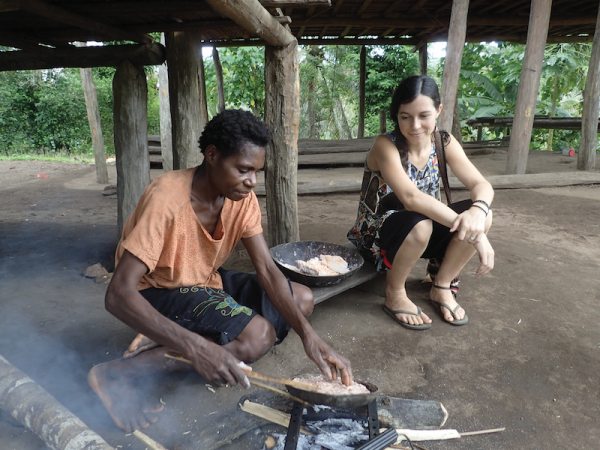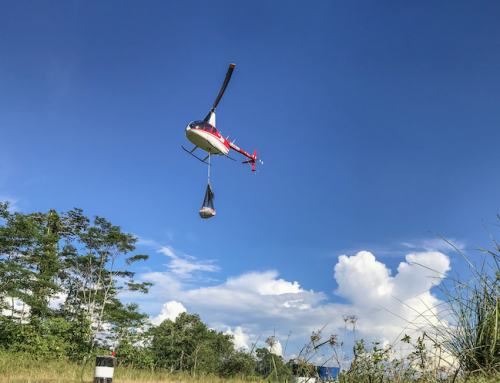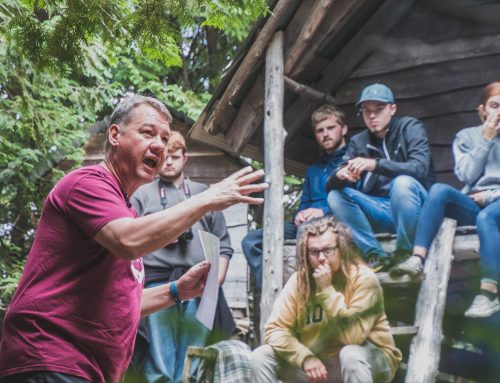Maybe the answers to those big questions that plague Christians really aren’t that difficult.
“For us, missions isn’t just one of the things the church is doing,” said Ben Hazen, director of adult discipleship at Community Baptist Church in Montoursville, Pennsylvania. “It’s not just one of the things that Christ said for the Church to do. This is something that God’s been up to from the very beginning, and I think when our people grasp that — there’s the reason. There’s the reason for missions.
“It’s not, ‘The missionary’s trying to get us interested in missions,’ or ‘The pastor’s trying to get us interested in missions,’ or ‘The apostles, they had this idea for missions.’ No, this is what God has been doing from the very beginning. I think if a church is going to catch a vision for missions and what God is doing, they have to understand that this is something God’s been doing from the beginning and that He’s going to do it to the end.”
Ben believes that view impacts people.
“We’ve found that when people see that purpose, they have a greater interest and desire to be involved in missions, and I would argue too, those who have stepped out in trying to be part of that purpose have found great joy and a big reason for being. They’ve found the [answers to], ‘What are we here for? What does God want for me? What’s God’s will for my life?’ They’ve started to find some of those answers, and they’re content — they have more joy.”
That sense of satisfaction and joy was evident in talking with others in the church.
“I’m happy to be part of something bigger than me,” said Troy Kanouff, who is on a sending team for one of the missionary couples supported by Community Baptist. Troy sees everything the church does as being connected to missions. “That’s what God calls us to be. It’s His story, and He wants us to tell others about Him. … It’s a cool thing, to be a part of that.”
“I got excited about being on a sending team,” said Missy Ward, who is on the sending team for Ethnos missionaries Tyler and Allegra Sanford. “I can see the impact it had on those missionaries.”
“I think if a church is going to catch a vision for missions and what God is doing, they have to understand that this is something God’s been doing from the beginning and that He’s going to do it to the end.”
— Ben Hazen
“I think if a church is going to catch a vision for missions and what God is doing, they have to understand that this is something God’s been doing from the beginning and that He’s going to do it to the end.”
— Ben Hazen
Missions Involvement Goes Deeper
Missions has always been part of the culture at Community Baptist. Harry Boyer, chairman of the church’s elder board, said reports on the very first meetings in 1950 show that early on they decided to guarantee a certain percentage of the church’s budget would always go to missions.
But it’s gone deeper.
“It has become a personal relationship between people,” he said. “Not just, ‘They are our missionaries and we support them because that’s what we should do.’ … It’s about building relationships. And when you build those relationships, people love you and work with you and support you because they love you.”
“And then that builds the next level,” Harry said. People begin to see what they can do and how they can be a part.
Community Baptist encourages that. “It’s not OK to do nothing when you can do something,” Ben said, “so we want to make sure that we explain to people what they can do.”
That’s vital because missions is a huge task.
“When you think about upwards of 1,600 language groups that haven’t been reached, when you think about the average annual need for a missionary—for the average person, that’s well beyond them,” Ben said. “No one person is going to reach 1,600 language groups. No one person’s going to raise 100 percent of a missionary’s support level. But what ends up happening is, if the average church-going person just ends up looking at things that are beyond them, they’re not going to get involved. They’re just going to say, ‘It’s too much for me.’…
“‘I want to, and I know I should, but I don’t know how.’ If we can break the task down into more manageable pieces, they feel like there’s something they can do.”
Missy agreed that the challenges can be “overwhelming” and that “it is hard to not think of it just as a money thing…. Obviously we can give—and we should—but … that isn’t the only way to be involved…. They can connect—let [missionaries] know they matter and that they’re not forgotten.”
Getting involved somehow, some way, leads to deeper involvement.
“We find there’s real momentum,” Ben said. “That when maybe they start supporting a missionary at $10 a month because that’s all they can afford, they’ll find it a lot easier to go to $25 a month or even $50 a month because there’s momentum.”
“Obviously we can give — and we should — but … that isn’t the only way to be involved.”
— Missy Ward
“Obviously we can give — and we should — but … that isn’t the only way to be involved.”
— Missy Ward
People Need to See the Bigger Picture
Ben, who is also missions committee chairman and who describes his job as “waving a big huge banner for missions,” says that explaining “the missionary process” is vital. People need to understand the big picture, the calling and the need, as well as the fact that missionaries move through training, support raising and on-field orientation before their church planting ministry can begin in earnest. Even then, the work moves through phases — moving in, learning the culture and language, teaching literacy, Bible teaching, disciple-making, leadership development and teacher training.
“A lot of them don’t even know that there are people over there who haven’t even heard the gospel before, and so we’ve found that laying out the whole process is key,” Ben said.
“When they see the whole process from start to finish, they can already start to connect the dots and see that, ‘Oh, they might need this,’ ‘Here’s a way that I might be able to help,’ ‘They’re going to need a house when they get over there? Well, hey, I’m a builder. I’m going to go over there and build them that house.’ Before they might have thought they’re going to rent that house in the middle of nowhere.
“So for us, we feel that information and teaching is key, because it’s going to be hard for us to engage with what we don’t know. But the more we know about it, the more we’ll see very clearly, hopefully maybe even by the Holy Spirit, how we can be involved.”
“Sending Teams” Help People Engage
That’s why “sending teams” like the ones Troy and Missy are on are so valuable to Community Baptist.
Through sending teams, Ben said, “our people have a direct way to be involved…. There are lots of times when a missionary comes home, and their needs are beyond one individual person.” Perhaps they need a car or face a big medical expense.
“We find our people are intimidated by that or are left with the question, ‘OK, how can I help?’”
But sending teams at Community Baptist connect people into a group of five to ten people who can advocate for the missionaries and “spread those needs out through the entire church,” Ben said.
Ben called sending teams “a direct line of communication back to the church.” And it’s not just about communicating needs or updates. It’s communicating what’s happening in their lives, even stuff that can be, as Ben says, “embarrassing or difficult.”
Or as Deb Hanczar, a member of the sending team for Ethnos missionaries Tim and Sue Sanford, said with a laugh: “It’s the one time that you’re allowed to be nosy.”
“You’ve got somebody in the church that knows about you and knows where you’re at,” Harry said. “It’s broken down the wall of, ‘We can’t share that because it would look bad.’ They can share on an intimate basis … those things you wouldn’t just tell everybody. It becomes that personal relationship.”
So, Troy didn’t just use WhatsApp to talk with the missionaries whose sending team he’s on. “I’m not a good singer, but I sang ‘Happy Birthday’ to them. That probably wasn’t good but made them laugh, I’m sure of that,” Troy said.
Missy is glad she’s been able to get to know Tyler and Allegra so well. “It’s exciting to know Tyler likes root beer and Allegra likes mango juice.”
“We’re interested because someone we know is interested in what’s going on, and that’s blessed the church because now you have people who might not know a particular missionary, but they know the person who is on their sending team, and that sending team person is excited and interested,
and that interest spills over.”
— Harry Boyer
“We’re interested because someone we know is interested in what’s going on, and that’s blessed the church because now you have people who might not know a particular missionary, but they know the person who is on their sending team, and that sending team person is excited and interested,
and that interest spills over.”
— Harry Boyer
Relationships Build Involvement
Harry said those personal relationships carry on through the church. “We’re interested because someone we know is interested in what’s going on, and that’s blessed the church because now you have people who might not know a particular missionary, but they know the person who is on their sending team, and that sending team person is excited and interested, and that interest spills over.”
Harry likened it to a spreading fire, igniting interest and involvement.
That’s why the sending teams are “an indirect way to disciple people,” Ben said.
“We’re finding that a lot of times our sending teams have more passion or interest in spiritual things…. I think it has something to do with rallying around a purpose, around a missionary…. And then when you see prayers answered and needs met, … there’s a greater level of excitement.”
That too carries over to “spur on real Christian community at our church. Yes, we want to see the missionary helped, … but we’ve benefitted way beyond that,” Ben said.

Cleon Watts, right, made new friends when he went from Community Baptist Chruch to Papua New Guinea to help build a house for Seth and Kaitlyn Sanford.

Students at Wayumi Expedition try their hand at learning an unwritten language

Cleon Watts, right, made new friends when he went from Community Baptist Chruch to Papua New Guinea to help build a house for Seth and Kaitlyn Sanford.

Students at Wayumi Expedition try their hand at learning an unwritten language

Cleon Watts, right, made new friends when he went from Community Baptist Chruch to Papua New Guinea to help build a house for Seth and Kaitlyn Sanford.

Students at Wayumi Expedition try their hand at learning an unwritten language
Wayumi: Another Avenue for Involvement
The Wayumi program in Pennsylvania has also been mutually beneficial.
“From the very beginning of the development of the Wayumi program, Community Baptist Church has been heavily involved,” said Greg Sanford, director of Wayumi and a teacher and elder at Community Baptist.
Teams helped remodel the buildings that had been used for years as a missionary training centre. Church member Cleon Watts stepped in to help oversee the work when an Ethnos missionary needed to step back due to a death in his family. They cleared land, built cabins, donated paneling and lumber and more.
“We had one group of retirees who became known as ‘The Wreckers’ because they came and gutted each building that needed to be remodelled,” Greg said.
Community Baptist members continue to be involved.
“We help buy before the groups come,” said Bill Hanczar, Deb’s husband. “We help clean after groups leave…. We’re…happy to be quiet and serving.”
“Linda, my wife, she comes up and she works in the kitchen, and she loves to be part of something like that,” Troy said. “It’s a blessing to us…. You come here, and you can work until you’re stone-dead tired, and you enjoyed yourself.”
“It’s another way for them to…be actually involved in missions,” Ben said. “I feel bad for the church that doesn’t have that opportunity.”
And there are additional benefits.
“Another thing Wayumi does for us,” Ben said, “is that it gives us a level of backing. It’s not just Community Baptist that’s interested in missions. It’s more than our church. There are many churches and groups. So Wayumi [is] another voice…saying this is true, this is what God has for us, this is God’s purpose, this is what He’s left us here to do. So, it’s not just us.”
Is It Too Much Involvement?
That’s not to say people don’t have questions and even doubts about the church’s missionary involvement at times.
“As you’re trying to advertise and push for missions, especially to give more for missions,” Ben said, “you think, ‘OK, are we taking away from our general fund and our things that we’re supposed to do as a church?’
“And I’ve just found that it appears that God loves to bless and spur on churches that are partnering with Him in a great way in the Great Commission. And so, I believe that any ounce of energy or even money that we put toward missions isn’t taking away from our bottom line: it’s going to add to our bottom line — that God sees that and rewards it.”
Deb called it “God’s math.”
She sees the same thing in the missions budget. “It’s like we look at this balance—we’ve spent this much money, [but] we’re up money.”
Beyond budgets and money is the question of success.
“We believe that missions is a key to being a successful church,” Ben said. “Succeeding at missions is going to make us a successful church, at least according to God’s idea of success.”
“It’s a blessing to us. … You come here, and you can work until you’re stone-dead tired, and you enjoyed yourself.”
— Troy Kanouf
“It’s a blessing to us. … You come here, and you can work until you’re stone-dead tired, and you enjoyed yourself.”
— Troy Kanouf
Facing Good Challenges
And like any step of faith, the missions emphasis has produced challenges, one of which Community Baptist is facing right now. A half-dozen couples and families from Community Baptist are prepar- ing to go to the mission field.
“We are in a unique position as a church,” Ben said.
The challenge is “how to make sure we’ve got adequate support financially for everybody that’s in the stream coming through,” Harry said. “We’re going to have to step up to the plate, because these are our people.”
“‘He who calls you is faithful, and He will do it,’” Ben quoted from 1 Thessalonians. He’s called us to reach the nations, and Ben said that “those churches that embrace that radically, maybe even at a great cost to themselves or beyond their budget or their regular means” will find Him faithful.
“It doesn’t mean we’re not nervous at times. [But] year after year the Lord continues to bless those that are stepping out.”
A Narrow, Deep View of Missions
Community Baptist does, however, take what some would see as a narrow view of missions.
“Our focus would be anyone and any efforts whose main goal is to get the gospel to those who have not heard,” Ben said.
“We believe very strongly that in the Great Commission itself when Jesus says therefore go and take the gospel to every tribe, tongue and nation … that He’s talking about ethnic groups. We believe that the key word for missions is ethnos [people group].”
But the view is also deep.
“For every one that’s out there on the front lines, there’s probably ten or twelve others who are not only buying supplies and teaching the kids and transporting people, [but] there are also supporters back here at home—those who are training those missionaries to get to the field, those people who…build their houses and all of that.
“We want to be able to connect the dots.”
That understanding has led one church member, Tom Garber, to begin a support ministry called I-Tech, serving the energy needs, particularly solar energy needs, of missionaries in remote locations. The church stands behind him because the dots connect.
“Every aspect is important,” Missy said. “They can’t do one without the other. They can’t be in the [village] if someone can’t take them the supplies.”
“It takes everybody involved to make this happen,” Troy agreed. “If it wasn’t for the Bible school, if it wasn’t for the training centre, if it wasn’t for Wayumi—it takes all of that to make it work…. Everyone has a place in that story.”
“We believe that missions is a key to being a successful church.”
— Ben Hazen
“We believe that missions is a key to being a successful church.”
— Ben Hazen
“We really do not differentiate between a [church] planter and a support missionary,” Harry said. “Our viewpoint of support missionaries is that they are part of the team, part of the string of everybody that has to be there to keep those missionaries on the field.”
“It’s the body of Christ, really, in action,” said Chris Santalucia, Community Baptist’s director of shepherding ministries.
“I think sometimes the people stateside might go…unnoticed,” said Shelly Karshner, who is on a sending team for PJ and Heather Garton who serve at Ethnos’s training centre in Missouri. “I think sometimes their needs can be way more than we realize.”
Deb recalled a trip she made to Papua New Guinea and the staff at a mission centre there.
“To see all those people in that supporting role, playing a role that is so vital — all the supply buying, the weight for the planes, everything packaged up. … It takes special people to do that.”
A Passion for People to Hear
Many would say it also takes special people to relate to missions and missionaries the way the folks at Community Baptist do. But it’s all a matter of the heart.
“You just have to have a love for wanting people to hear God’s story,” Troy said. “If you don’t have that love, I don’t think missions, I don’t think church, I don’t think any of that works for you. You have to have that passion for people to hear the gospel message.”
Learn More About Sending and Sending-teams
The book Serving as Senders — Today by Neil Pirolo addresses both the need for people to partner with missionaries and the six areas of care that a missionary needs to function effectively while preparing to go, on the field and upon returning home. Available at bookstores and online.
Ben Hazen, missions committee chairman at Community Baptist Church, is available via email for information about sending teams: bhazen@experiencecommunity.org
Dawn Sanford helped develop and implement the concept of sending teams at Community Baptist and can also be reached by email:
dmsanford@gmail.com






